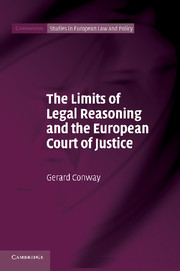Crossref Citations
This Book has been
cited by the following publications. This list is generated based on data provided by Crossref.
Bogojević, Sanja
2013.
EU Climate Change Litigation, the Role of the European Courts, and the Importance of Legal Culture.
Law & Policy,
Vol. 35,
Issue. 3,
p.
184.
Davies, Gareth T.
2014.
Internal Market Adjudication and the Quality of Life in Europe.
SSRN Electronic Journal ,
Hubkova, Pavlina
2014.
Economic Reasoning in the Court of Justice of the EU: A Study on the Use of Economics in Competition Case-Law.
SSRN Electronic Journal,
Sennekamp, Andreas
and
van Damme, Isabelle
2014.
A PRACTICAL PERSPECTIVE ON TREATY INTERPRETATION: THE COURT OF JUSTICE OF THE EUROPEAN UNION AND THE WTO DISPUTE SETTLEMENT SYSTEM.
Cambridge Journal of International and Comparative Law,
Vol. 3,
Issue. 2,
p.
489.
Horsley, Thomas
2015.
‘The Court Hereby Rules…’ – Legal Developments in EU Fundamental Rights Protection.
JCMS: Journal of Common Market Studies,
Vol. 53,
Issue. S1,
p.
108.
Pico Toro, Ivan
2015.
Judicial Lawmaking in the EU Internal Market.
SSRN Electronic Journal,
Brittain, Stephen
2015.
The Relationship Between the EU Charter of Fundamental Rights and the European Convention on Human Rights: an Originalist Analysis.
European Constitutional Law Review,
Vol. 11,
Issue. 3,
p.
482.
Misonne, Delphine
2015.
The Importance of Setting a Target: The EU Ambition of a High Level of Protection.
Transnational Environmental Law,
Vol. 4,
Issue. 1,
p.
11.
Gideon, Andrea
2015.
The Position of Higher Education Institutions in a Changing European Context: An EU Law Perspective.
JCMS: Journal of Common Market Studies,
Vol. 53,
Issue. 5,
p.
1045.
Korthals Altes, Willem K.
2016.
Freedom of Establishment Versus Retail Planning: The European Case.
European Planning Studies,
Vol. 24,
Issue. 1,
p.
163.
2016.
European Constitutional Language.
p.
11.
2016.
European Constitutional Language.
p.
70.
Gjørtler, Peter
2017.
Democratic Legitimacy in the European Union and Global Governance.
p.
157.
Santos Silva, Marta
2017.
The Draft Common Frame of Reference as a "Toolbox" for Domestic Courts.
p.
31.
Itzcovich, Giulio
2017.
Comparative Constitutional Reasoning.
p.
277.
Jakab, András
Dyevre, Arthur
and
Itzcovich, Giulio
2017.
Comparative Constitutional Reasoning.
p.
1.
Nalule, Caroline
2018.
Defining the Scope of Free Movement of Citizens in the East African Community: The East African Court of Justice and its Interpretive Approach.
Journal of African Law,
Vol. 62,
Issue. 1,
p.
1.
Conway, Gerard
2018.
How to Measure the Quality of Judicial Reasoning.
Vol. 69,
Issue. ,
p.
225.
Eriksen, Erik O.
2018.
Getting to agreement: mechanisms of deliberative decision-making.
International Theory,
Vol. 10,
Issue. 3,
p.
374.
Schenk, Angelika
and
Schmidt, Susanne K.
2018.
Failing on the social dimension: judicial law-making and student mobility in the EU.
Journal of European Public Policy,
Vol. 25,
Issue. 10,
p.
1522.



